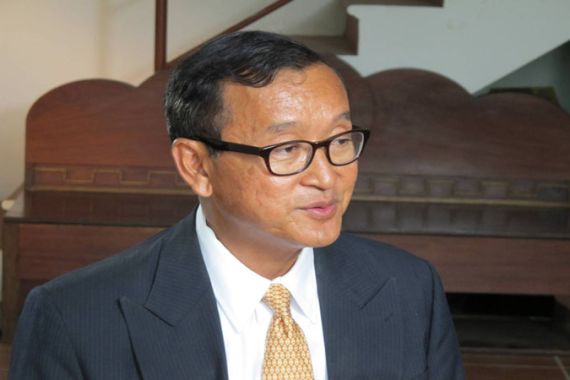Q&A: How credible was Cambodia’s election?
Al Jazeera speaks with Cambodian opposition leader Sam Rainsy about Sunday’s vote results.

Phnom Penh, Cambodia – Cambodia’s opposition party, despite nearly doubling its representation in the country’s parliament in Sunday’s election, has rejected the results amid allegations of widespread irregularities.
Opposition leader Sam Rainsy on Monday called for the creation of a special committee, including representatives from both parties and local and international experts, to investigate the allegations and find a solution – either by holding new polls in the most severely affected provinces, or re-running the entire election.
Analysts had expressed concern about the credibility of the electoral roll long before polling day, with independent audits suggesting large numbers of dead voters as well as duplicate names. There have also been claims of intimidation with the well-funded ruling party controlling the police and military and making use of government vehicles to campaign.
Rainsy, who only returned to Cambodia just a week ago, was barred from contesting the election and wasn’t even able to vote. He spent nearly four years in exile in France after being found guilty on what he said were politically motivated charges.
Al Jazeera sat down with the opposition leader for an exclusive interview in Phnom Penh.
AJ’s Scott Heidler: You called Sunday’s election a historic day. Why have you now rejected the results?
Sam Rainsy: I congratulated the Cambodian people for their massive participation in the election and this election has seen a big surge of support for the opposition. People are calling for change. People are being more and more brave.
Our first goal will be to ensure the rule of law because, in this country, there’s the rule of the gun and the rule of money.
SH: So why did you reject the results?
SR: There are so many irregularities that were exposed even before voting day. We know that this was a foregone conclusion; that the ruling party organised the election in such a way as to secure victory even before voting day.
SH: You’ve called for this committee to investigate. What do you hope to achieve?
SR: The committee has just to confirm that irregularities are so widespread that they have distorted the will of the Cambodian people. We want this fact to be recognised by everybody; that, yes, the will of the Cambodian people has been distorted, seriously distorted.
SH: When you look at the number of seats you gained, do you think these irregularities prevented you from getting a lot more seats or maybe even an outright victory?
SR: I’ll give you an example. The result proclaimed by the ruling party gave them only 200,000 votes more than the opposition, but 1.3 million voters were disenfranchised. They have seen their names deleted from the voter list and those people are, in their great majority, opposition supporters. Had these people who were unfairly disenfranchised, or even only a small proportion of these people, been allowed to vote, we would have beaten the ruling party. This is just one irregularity among others.
SH: Do you think the investigation will be a distraction in moving forward with your new-found influence in parliament?
SR: The investigation must be completed within a month. With political will this can be done and then we can move forward on the basis of strong, democratic principles.
SH: Is that realistic given that the ruling party is likely to be reluctant to participate?
SR: They will have to take responsibility because they need our participation in the formation of a new National Assembly and a new government. If we don’t recognise the elections and if there are no measures to redress what we have denounced as an injustice to the Cambodian people the situation will get worse, in the sense that there will be deadlock. Those who are in government should ensure there is no deadlock.
SH: Looking forward, once this is over and the issues resolved, what will be your first goal?
SR: Our first goal will be to ensure the rule of law because, in this country, there’s the rule of the gun and the rule of money. We want to promote the rule of law to ensure that every citizen is treated equally. We will fight against the corruption that is rampant in this country. We will ensure transparency and accountability; the key ingredients for good governance because without good governance this country is going nowhere, or even down the drain.
For the vast majority of the population there’s been no progress. They remain poor. The so-called economic progress benefits only the elite, a very small portion of the population. The forest is being destroyed and other natural resources. Even the social fabric is being destroyed because of human trafficking and prostitution, so we need policies to ensure sustainable and equitable development for Cambodia.
SH: Any contact at all between yourselves and the ruling party so far?
SR: We are facing leaders who are former Khmer Rouge, who are former Communists; they want to rule alone. Their only objective is to get rid of any opposition. We hope that now they can come to terms with the new reality; that the balance of power has changed and that it is time to establish a dialogue with the opposition instead of, at best, ignoring them and, at worst, killing them.
SH: You nearly doubled your seats. Do you see this as a victory?
SR: Any gain by the opposition is a gain for democracy. It’s a gain for the country. We are very proud and very grateful to the Cambodian people who dared to come to vote en masse for the opposition, to demand democratic change. Given the unprecedented support shown by the people for the opposition and given the fact that elections in this country are terribly rigged, we should have won this election by a wide margin.